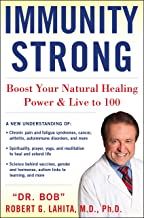 Founded in 1980 |
|
|
Robert Lahita, Immunity Strong: Boost Your Natural Healing Power and Live to 100 West Palm Beach, FL, Humanix Books, 2022 ISBN 9-781-63006-195-1 |
Reviewer: Alan Lippman / February 21, 2022
What is the “soul?” Merriam-Webster defines the soul as “the immaterial essence, animating principle, or actuating cause of an individual life” and “the spiritual principle embodied in human beings.” The Greek philosopher, Plato, believed that humans were dual creatures and that when the material body dies the soul lives on.
Plato notwithstanding, others throughout history have wondered about the origins and power of spirituality, prayer, introspection, and morality, questioning their physiologic basis and how they shape human behavior. Plausible insights are now provided in Immunity Strong, a lively and believable work by ‘Dr. Bob’ Lahita, MHSNJ’s loyal and respected member and incoming President.
The key, postulates Lahita, is the immune system, an incredibly complex biological force that interfaces with the environment to integrate all the functions needed for life and for the maintenance of health and well-being, including behavior. Lahita terms this the “biological soul” and uses this concept to explain his view of the mind-body relationship and how understanding and acting on such principles can lead to optimization of the body’s healing power.
In just 219 easily-read pages, organized into twelve concise chapters, Dr. Bob elucidates for the inquisitive reader how the immune system responds to threats to the body’s homeostasis, the possible role of biome communities to influence behavior, and the importance of sleep and stress modification for the maintenance of optimum immune function. The author addresses the ways in which the immune system deals with infectious threats, how vaccines both prevent and mitigate the effects of many illnesses (including relevant comments about Covid-19), and what happens when immune malfunction results in autoimmunity. Other sections deal with the genetic and epigenetic phenomena that underlie the myriad manifestations of immune physiology, providing compelling insights into behavioral conditions, neurodevelopmental abnormalities, and longevity. Further, Lahita explores the association of immune deficits with mental illness and its implications for more definitive and personalized treatment. In the concluding chapter, he offers cogent predictions for future health and contentment, through an appreciation of the “biological soul.”
Although written for a lay audience, this book may be enjoyed by medical professionals who can learn more effective ways to communicate otherwise complex scientific matters to their inquiring patients. The author’s language is lucid, readily understandable, and unencumbered by distracting footnotes and parenthetical citations. Such literary devices as analogy and author’s asides (“DR. BOB SAYS”) help to focus on and summarize critical points. A useful glossary and detailed index both represent thoughtful supplements.
DR. ALAN SAYS this book is highly recommended for its explications, elucidations, and clarity. Besides, it is delightful to read.
Alan J. Lippman, MD
February 21, 2022
